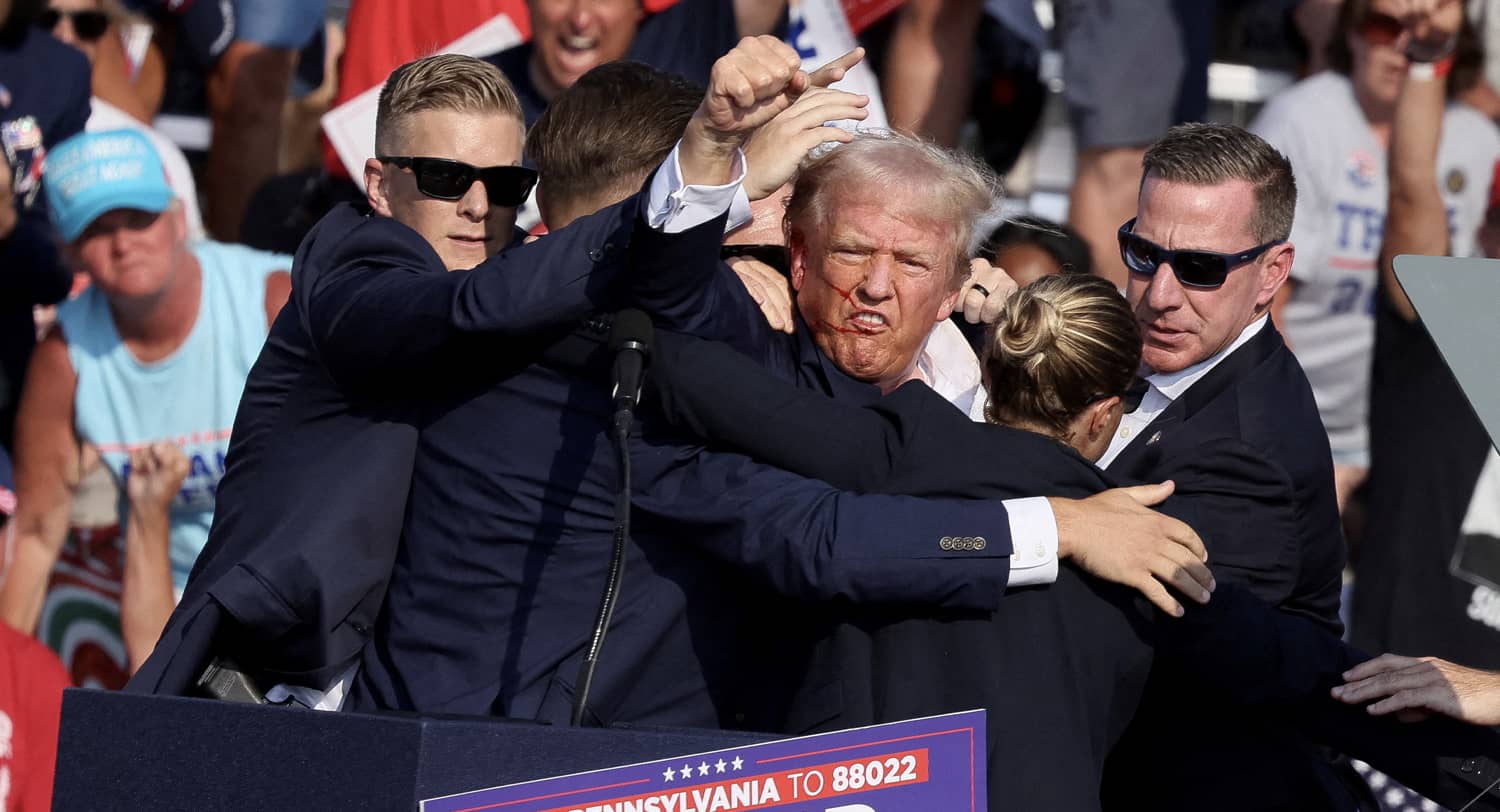The image of former president Donald J. Trump, at the age of seventy-eight, wrestling with the Secret Service to stand upright and pump his fist in the air and shout, “Fight! Fight! Fight!” has resonated throughout the world. Bloodied but undefeated, he resembled a roaring lion to his supporters. Republican pollster Frank Luntz predicts that the shooting “will definitely impact the final vote, guaranteeing that every Trump voter will actually vote.”
Within hours of being rushed to the hospital, Trump was thanking the police and ambulance drivers. He brushed away all talk of postponing the Republican National Convention in Milwaukee, where he accepted his party’s nomination in one of the longest speeches in the history of Grand Old Party. His voice was soft as he recounted, moment by moment, the shooting, which wounded him and two supporters and killed a fireman. Trump walked to the fireman’s coat and helmet and kissed it, thanking the man for his sacrifice as the crowd quieted and took in its breath. This electrified the crowd. He wasn’t fishing for sympathy but sharing a moment of worry, anxiety, and triumph that had been felt by every Republican in the room and all of those watching on screen. Any gap between Trump and his supporters closed.
Next, he turned to the future with hope and energy. Together, he said, we will set the world right and bring peace to Ukraine and Israel. He announced shared goals and collective desire to reach them, not a complex plan in triplicate.
This wasn’t a typical paint-by-numbers policy speech – the kind of thing negotiated beforehand by committees in small rooms—but a vision of big goals and the confidence to pursue them. This hasn’t been seen since John F. Kennedy announced that America would go to the moon or since Ronald Reagan demanded that Premier Gorbachev “tear down this wall” in Berlin.
And his confidence in reaching toward hard goals was underlined by all he and his supporters had endured over the past eight years. Trump took his biggest weakness—the crowd of controversies since 2016—and transformed them into proof that he can overcome hard things.
He spoke of what he and America had suffered together. The massive “Women’s March” against his presidency occurred before the 2017 inauguration. The investigations of meritless “Russian collusion” dominated his first two years and the two impeachment attempts, which failed to convict, overshadowed his last two years and even his last days in office. Leaks and lawsuits showered his every move.
Then came the post-election civil and criminal cases against Trump, which sought to bankrupt and jail him. Now, the would-be assassin’s bullet carved a line across his cheek and ear. Trump supporters can also trace a line of violent attacks against their team. In 2017, a shooter wounded Representative Steve Scalise (R-LA) while practicing for the congressional baseball game. In 2022, a stalker attempted to kill Supreme Court Justice Brett Kavanaugh, a Trump nominee, in his Chevy Chase home before giving himself up to the police. This allows the Trump supporters to tell themselves a story of suffering and struggle.
Trump, if victorious, will inherit a dangerous world. Russia is on the march in Ukraine, backed by bombs and bullets from North Korea, drones from Iran, and money from China. China, itself, has built the world’s largest navy and is testing high-orbit space weapons. It is clear that China’s competition will not be limited to commerce. Iran has fueled a multi-front proxy war against Israel with Hamas in Gaza and Hizbullah in Lebanon.
From Trump’s speech, it is clear the former president understands the link between Iran’s fortunes and peace in the Middle East. “Iran was broke” when Trump left office, he said repeatedly. He was all but saying that his tough embargo, one that buys or sells nothing with Tehran, is the best way to end the proxy wars against Israel. Iran must no longer have the funds for Hamas, Hizbullah, the Houthis and other proxies and in order to achieve that result, the world must isolate and exile Iran.
Let us not forget that Trump also brought us the Abraham Accords. This is far more than peace treaties between Israel and its Arab neighbors. It was built on the insight that prosperity for the Palestinians and other Arabs is the shortest path to a sustainable peace. Per capita income of Israelis is more than five times that of Gazans or Egyptians or Lebanese. Closing that gap by raising the incomes of Arabs would replace anger with hope.
Something similar needs to be done to deter illegal immigration from Africa, Asia, and South America into the United States and Western Europe. If there are well-paying jobs and affordable houses at home, there is little reason to risk their lives on treacherous seas or murderous sands. A shared prosperity would save lives and alleviate misery among both migrants and those that they leave behind. This could be the real Trump legacy.
Trump is a survivor. He has demonstrated the ability to take on hard tasks. Will voters turn to him because they sense that tough times require strong leaders? The ballot box will answer that question.

